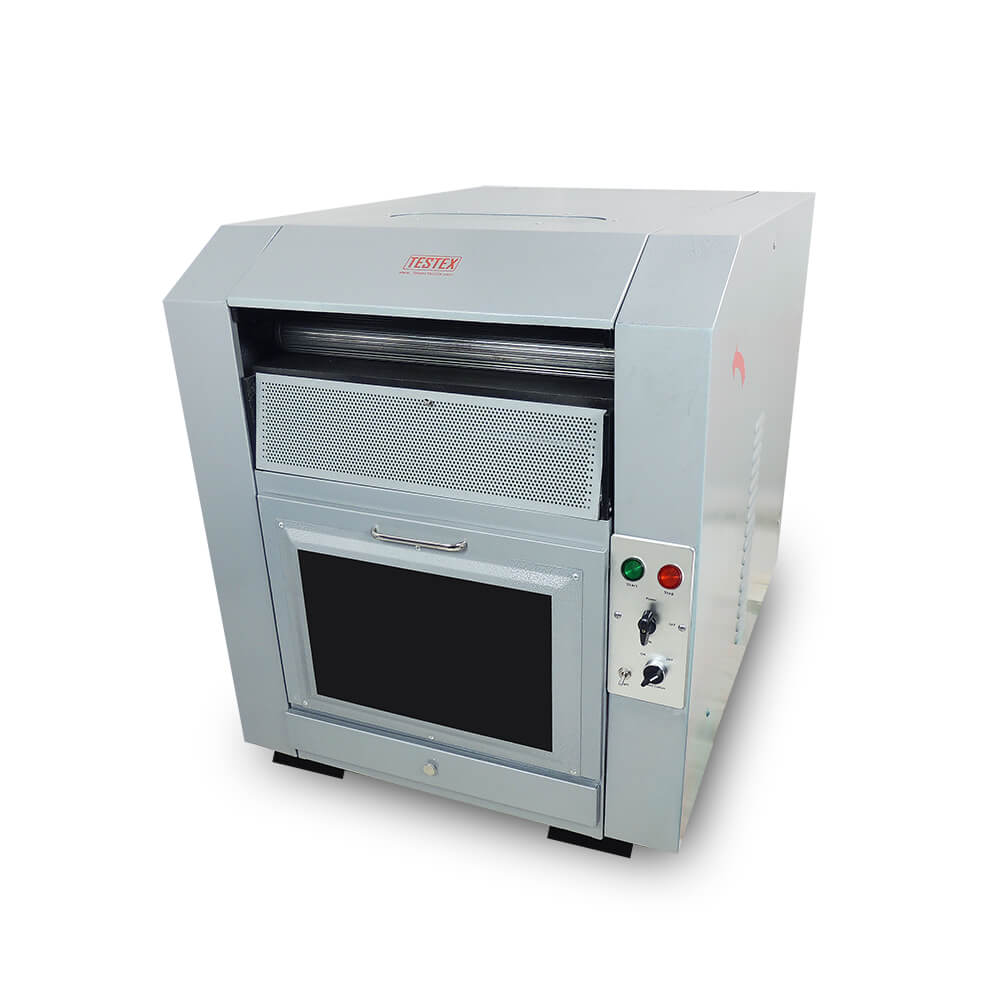Cotton Trash Analyzer TB500
Cotton Trash Analyzer is designed to analyze lint, trash, and dust content within a sample of raw cotton fiber up to 100 grams. TESTEX Cotton Trash Analyzer TB500 complies with GB/T 6499. If you want to know more about Cotton Trash Analyzer prices, please contact us. As a professional supplier of textile instruments, we are devoted to providing Cotton Trash Analyzer with high quality and reasonable prices.
Description
Application
Cotton Trash Analyzer is widely applied to analyze lint, trash, and dust content within a sample of raw cotton fiber up to 100 grams. Also, it is suitable to determine the non-fiber content of synthetic fibers and to open and clean fibers for further testing. The analyzer uses the carding principle with air separation of lint and non-lint content.
Test principle
This machine is designed according to the principle of mechanical aerodynamics. At first, loosening the fiber and adhering impurities by combing with the saw teeth of the barbed rollers. Then under the action of mechanical and airflow, separating the fiber and impurities due to the different shapes, specific gravity, and the force acting on them.
Specifications
- Working width: 490 mm
- Size of feeding roller: Dia.57.15 mm
- Size of Licker-in: Dia. 238 mm
- Rotation speed: 900 r/min
Features
Sturdy and durable due to its all-metal structure
Impurities box at the top of the machine with lighting fixtures
The instrument complies with the specified regulations as well as standards
Feed roller by the special slow motor driver, so the feed cotton speed controllable
Maintenance
It is very important to make the maintenance of Cotton Trash Analyzer. Only test the specimen by applying a smoothly running analyzer, can we gain accurate results.
1 Before starting the machine, check each oil cup and fill it with a certain amount of oil to lubricate the parts and ensure adequate lubrication of the drive and bearing parts.
2 Check the separation distance between the barbed roller and the cotton feeder. Obviously, the larger the separation distance, the less fiber will be combed by the barbed roller. When the separation distance is too large, it will be difficult to comb the fiber at the bottom of the cotton layer under the normal combing of the barbed roller. However, if the separation distance is too small, the resistance of trash to breaking will decrease even though there will be more chances of combing. In the end, they will affect the analysis result.
3 In the analysis of trash, a large number of free fibers or partial cotton blocks were found in the trash plate. Apart from checking the separation distance between the parts, we should also check its air duct and fan. When the machine gets blocked, we should carry out prompt measurements.
Weight
| 275 kg |
Power
| 380 V | 50/60 Hz | 0.8 Kw |
Dimensions
| Length: 1020 mm | Width: 720 mm | Height: 880 mm |
Standards
| GB/T 6499 |
Welcome to TESTEX – a professional Cotton Trash Analyzer supplier – Tensile Tester is on sale, contact us to get a detailed price quote.
4 reviews for Cotton Trash Analyzer TB500
You must be logged in to post a review.
Terminology
Trash
It refers to non-cotton fibrous material and the attached fiber contained in the cotton, such as sand, branches and leaves, insect carcasses, cotton seeds, soft seed epidermis, etc.
Percentage of trash
It points to the percentage of the quality of impurities and samples for the specified specimen.
Test procedure
Before starting the machine, open the lighting and the fan flaps. Then turn on the machine to idle and clean it after stopping working.
Before performing the test, use the electronic balance or case scale to weigh the laboratory sample.
During the test, tear the test specimen and lay it on the cotton table smoothly and evenly.
When the machine operates normally, feed the test specimen evenly between the cotton feeding roller and the cotton feeding table with your hands.
After the completion of the test, take the net cotton out, put longitudinally flat on the cotton feed table, and then analyze it again.
Finally, turn off the machine to collect the impurities in the tray.
Test report form about the impurity rate of
raw cotton
Test number | Test specimen mass (g) | Analysis of impurity mass (g) | Picked impurity mass (g) | Impurity rate (%) |
test report
The test report includes the test specimen's rate of impurity and states the source of the batch sample (batch number), the length of grade fabric, test species, laboratory sample number, test date, temperature, humidity, etc.
[contact-form-7 id="16355" title="Inquiry"]


Yvette Warner –
Works great and it’s reliable.
Jerome Lily –
Trash Analyzer received.Well packaged and work as it should.
Rodney Tony –
The machine helps me a lot,it is worthly.
Marguerite Julia –
Really fast delivery,thanks manufacturer.